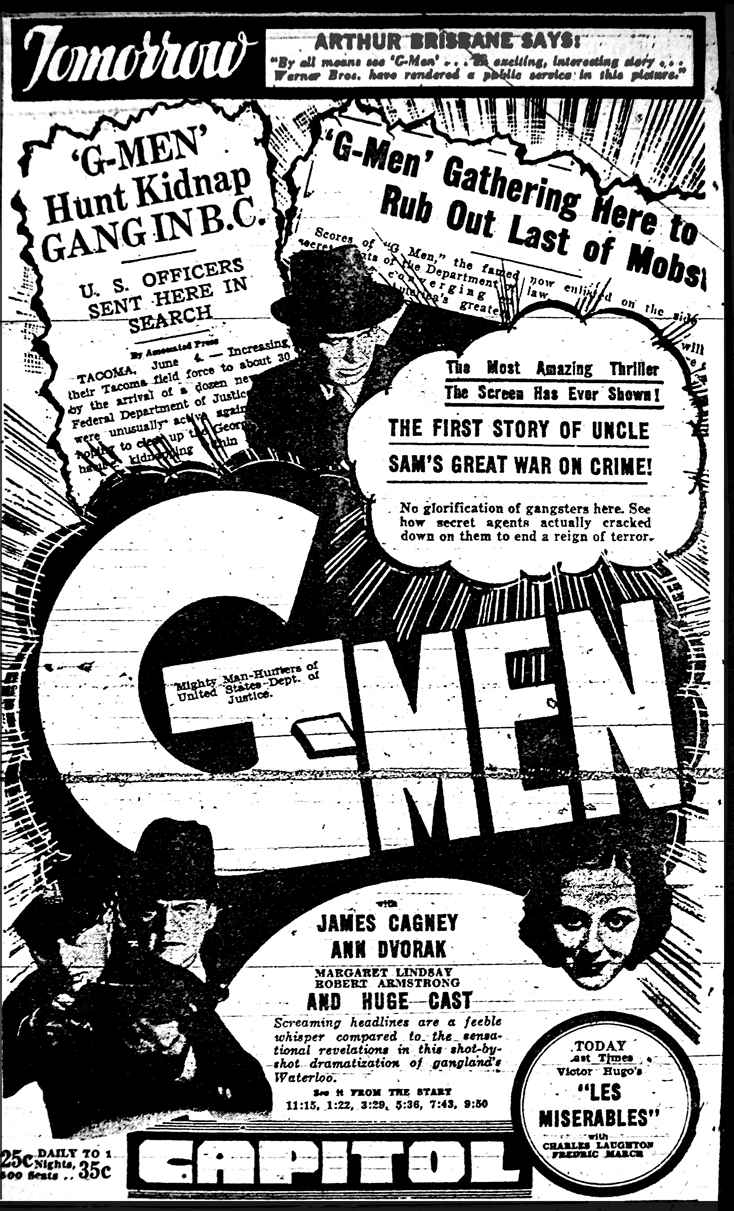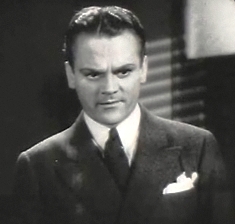G Men on:
[Wikipedia]
[Google]
[Amazon]
''G Men'' is a 1935
 One year after graduation,
One year after graduation,

Warner Bros.
Warner Bros. Entertainment Inc. (commonly known as Warner Bros. or abbreviated as WB) is an American film and entertainment studio headquartered at the Warner Bros. Studios complex in Burbank, California, and a subsidiary of Warner Bros. D ...
crime film starring James Cagney
James Francis Cagney Jr. (; July 17, 1899March 30, 1986) was an American actor, dancer and film director. On stage and in film, Cagney was known for his consistently energetic performances, distinctive vocal style, and deadpan comic timing. He ...
, Ann Dvorak
Ann Dvorak (born Anna McKim; August 2, 1911 – December 10, 1979) was an American stage and film actress.
Asked how to pronounce her adopted surname, she told ''The Literary Digest'' in 1936: "My fake name is properly pronounced ''vor'shack ...
, Margaret Lindsay
Margaret Lindsay (born Margaret Kies; September 19, 1910 – May 9, 1981) was an American film actress. Her time as a Warner Bros. contract player during the 1930s was particularly productive. She was noted for her supporting work in successf ...
and Lloyd Nolan
Lloyd Benedict Nolan (August 11, 1902 – September 27, 1985) was an American film and television actor. Among his many roles, Nolan is remembered for originating the role of private investigator Michael Shayne in a series of 1940s B movies.
B ...
in his film debut. According to ''Variety
Variety may refer to:
Arts and entertainment Entertainment formats
* Variety (radio)
* Variety show, in theater and television
Films
* ''Variety'' (1925 film), a German silent film directed by Ewald Andre Dupont
* ''Variety'' (1935 film), ...
,'' the movie was one of the top-grossing films of 1935. The supporting cast features Robert Armstrong and Barton MacLane
Barton MacLane (December 25, 1902 – January 1, 1969) was an American actor, playwright, and screenwriter. He appeared in many classic films from the 1930s through the 1960s, including his role as General Martin Peterson on the 1960s NBC ...
.
''G Men'' was made as part of a deliberate attempt by the Warners to counteract what many political and business leaders claimed was a disturbing trend of glorifying criminals in the early 1930s gangster film genre. Although the gangster films were typically presented as moral indictments of organized crime where the criminal protagonist inevitably died, they nevertheless depicted a life of freedom, power and luxury enjoyed by gangsters in the midst of a real-life economic crisis. Foremost of these films were '' Little Caesar'', the original '' Scarface'', and perhaps the most memorable, ''The Public Enemy
''The Public Enemy'' (''Enemies of the Public'' in the UK) is a 1931 American all-talking pre-Code gangster film produced and distributed by Warner Bros. The film was directed by William A. Wellman and stars James Cagney, Jean Harlow, Edward ...
'', in which Cagney portrayed street tough Tom Powers, the role that catapulted him to stardom. What was deemed most objectionable about these films was that law enforcement was typically portrayed as either impotent in the face of crime, or, as with ''Public Enemy'', akin to a derelict and largely absentee father shirking his duty. Based on this interpretation, ''G Men'' supplanted the criminal protagonist with the heroic federal police officer.
Most prints of this film include a brief prologue
A prologue or prolog (from Greek πρόλογος ''prólogos'', from πρό ''pró'', "before" and λόγος ''lógos'', "word") is an opening to a story that establishes the context and gives background details, often some earlier story that ...
added at the beginning for the 1949 re-release (on the FBI
The Federal Bureau of Investigation (FBI) is the domestic Intelligence agency, intelligence and Security agency, security service of the United States and its principal Federal law enforcement in the United States, federal law enforcement age ...
's 25th anniversary). This scene depicts a senior agent (played by David Brian) introducing a screening of the film to a group of FBI recruits so that they may learn about the Bureau's history.
Plot
 One year after graduation,
One year after graduation, New York City
New York, often called New York City or NYC, is the List of United States cities by population, most populous city in the United States. With a 2020 population of 8,804,190 distributed over , New York City is also the L ...
lawyer James "Brick" Davis (James Cagney
James Francis Cagney Jr. (; July 17, 1899March 30, 1986) was an American actor, dancer and film director. On stage and in film, Cagney was known for his consistently energetic performances, distinctive vocal style, and deadpan comic timing. He ...
) has no clients because he refuses to compromise with his ideals and integrity. His friend Eddie Buchanan (Regis Toomey
John Francis Regis Toomey (August 13, 1898October 12, 1991) was an American film and television actor.
Early life
Born in Pittsburgh, Pennsylvania, he was one of four children of Francis X. and Mary Ellen Toomey, and attended Peabody High ...
) tries to recruit him as a federal agent or "G Man" (government man), but Davis is unsure. However, when Buchanan is killed while trying to arrest a gangster, Davis changes his mind, determined to bring the killer to justice. He bids farewell to his mentor, "Mac" MacKay (William Harrigan
William Harrigan (March 27, 1894 – February 1, 1966) was an American actor who performed in Hollywood during the 1930s and 1940s and on stage.
Early years
Harrigan was born in New York City and attended New York Military Academy. Harrigan was ...
), a mob boss who financed his education to keep Davis on the right side of the law. He bids farewell to Jean Morgan (Ann Dvorak
Ann Dvorak (born Anna McKim; August 2, 1911 – December 10, 1979) was an American stage and film actress.
Asked how to pronounce her adopted surname, she told ''The Literary Digest'' in 1936: "My fake name is properly pronounced ''vor'shack ...
), the star of MacKay's nightclub who has feelings for Davis.
Davis travels to Washington, D.C. to begin his training. A mutual dislike forms immediately between him and his instructor, Jeff McCord ( Robert Armstrong) which eventually subsides as time passes, but not before McCord openly mocks and derides Davis' attempts at training . However, Davis is attracted to McCord's sister Kay (Margaret Lindsay
Margaret Lindsay (born Margaret Kies; September 19, 1910 – May 9, 1981) was an American film actress. Her time as a Warner Bros. contract player during the 1930s was particularly productive. She was noted for her supporting work in successf ...
) which strengthens his determination to remain passive despite McCord's efforts to rile him.
Meanwhile, MacKay retires and buys a resort lodge out in the woods of Wisconsin. His men, free of his restraint, embark on a crime spree. Hamstrung by existing laws (federal agents have to get local warrants and are not even allowed to carry guns), the head of the G-Men pleads for new laws to empower his beleaguered men. They are enacted with great speed.
Davis identifies one of the perpetrators, Danny Leggett (Edward Pawley
Edward Joel Pawley (March 16, 1901 in Kansas City, Missouri – January 27, 1988 in Charlottesville, Virginia) was an American actor of radio, films and Broadway. The full name on his birth certificate is Edward Joel Stone Pawley; he never u ...
), by his superstition of always wearing a gardenia. Not having completed his training, he can only give agent Hugh Farrell (Lloyd Nolan
Lloyd Benedict Nolan (August 11, 1902 – September 27, 1985) was an American film and television actor. Among his many roles, Nolan is remembered for originating the role of private investigator Michael Shayne in a series of 1940s B movies.
B ...
) tips on Leggett's habits. His quarry is tracked and captured by Farrell, but he and some of his men are gunned down, and Leggett flees.
McCord is put in charge of the manhunt and given his choice of five agents. He picks Davis, a decision that later pays dividends when Jean is brought in for questioning, Davis learns she is now married to Collins (Barton MacLane
Barton MacLane (December 25, 1902 – January 1, 1969) was an American actor, playwright, and screenwriter. He appeared in many classic films from the 1930s through the 1960s, including his role as General Martin Peterson on the 1960s NBC ...
), one of the crooks. She inadvertently lets slip that the gang is hiding out at MacKay's lodge (against MacKay's will). In the ensuing wild shootout, Davis kills MacKay, who was being used as a human shield. Before he dies, MacKay forgives his distraught friend. Davis then tries to resign from the department but McCord talks him out of it by reminding him that McKay's death wasn't his fault and asks him to stay on.
Only Collins gets away. McCord and Davis go to Jean's apartment to warn her. Jean is not there, but Collins is, and shoots at them. Davis pushes McCord out of the way and takes a bullet meant for him. Collins gets away. Davis ends up in the hospital (where Kay is a nurse) for his shoulder wound. Collins kidnaps Kay to use as a hostage. Jean finds out where he is hiding and telephones Davis, only to be shot by her husband. Davis bolts from his hospital bed, has some final words for the dying Jean, sneaks inside the garage and rescues Kay. Collins is shot to death by McCord as he tries to drive away. Kay escorts the still-bandaged Davis back to the hospital, vowing to "handle your case personally."
Cast

Reception
In 2008, theAmerican Film Institute
The American Film Institute (AFI) is an American nonprofit film organization that educates filmmakers and honors the heritage of the motion picture arts in the United States. AFI is supported by private funding and public membership fees.
Leade ...
nominated this film for its Top 10 Gangster Films list.
Box Office
According to Warner Bros records, the film earned $1,143,000 domestically and $820,000 internationally.References
Notes
Bibliography
* *External links
* * * * * {{Darryl F. Zanuck 1935 films 1935 crime drama films American crime drama films American black-and-white films 1930s English-language films Films about organized crime in the United States Warner Bros. films Films directed by William Keighley Films produced by Hal B. Wallis 1930s American films Films scored by Bernhard Kaun Films about lawyers Films set in Washington, D.C.